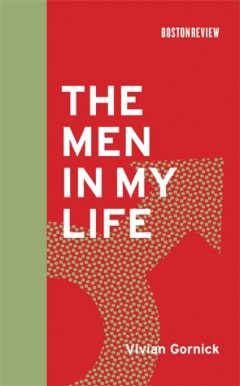Filter by

The Men in My Life
Gornick on V. S. Naipaul, James Baldwin, George Gissing, Randall Jarrell, H. G. Wells, Loren Eiseley, Allen Ginsberg, Hayden Carruth, Saul Bellow, and Philip Roth and the intimate relationship between emotional damage and great literature. Vivian Gornick, one of our finest critics, tackled the theme of love and marriage in her last collection of essays, The End of the Novel of Love, a Nation…
- Edition
- -
- ISBN/ISSN
- 9780262274104
- Collation
- -
- Series Title
- -
- Call Number
- -

Beyond austerity :reforming the Greek economy
More than eight years after the global financial crisis began, the economy of Greece shows little sign of recovery, and its position in the eurozone seems tenuous. Between 2008 and 2014, incomes in Greece shrank by more than 25 percent, homes lost more than a third of their value, and the unemployment rate reached 27 percent. Most articles on Greece in the media focus on the effects of austerit…
- Edition
- -
- ISBN/ISSN
- 9780262339216
- Collation
- 1 online resource (x, 720 pages) :illustrations
- Series Title
- -
- Call Number
- -

Fascist pigs :technoscientific organisms and the history of fascism
How the breeding of new animals and plants was central to fascist regimes in Italy, Portugal, and Germany and to their imperial expansion.OCLC-licensed vendor bibliographic record.
- Edition
- -
- ISBN/ISSN
- 9780262335706
- Collation
- 1 online resource.
- Series Title
- -
- Call Number
- -

Theory and Evidence: The Development of Scientific Reasoning
A Bradford book."In Theory and Evidence Barbara Koslowski, long acknowledged for her empirical work in the field of cognitive-developmental research, brings into sharp focus the ways in which the standard literature both distorts and under-estimates the reasoning abilities of ordinary people. She provides the basis of a new research program for a more complete characterization of scientific rea…
- Edition
- -
- ISBN/ISSN
- 9780262277471
- Collation
- 1 online resource (xii, 298 pages) :illustrations.
- Series Title
- -
- Call Number
- -

A Theory of Content and Other Essays
A Bradford book."OCLC-licensed vendor bibliographic record.
- Edition
- -
- ISBN/ISSN
- 9780262287999
- Collation
- 1 online resource (xii, 270 pages)
- Series Title
- -
- Call Number
- -

A Theory of General Ethics: Human Relationships, Nature, and the Built Enviro…
An integrated approach to ethics that covers interhuman ethics, the ethics of the natural environment (including animals), and the ethics of the built environment, and enables us to offer sensible and defensible answers to the widest possible range of eth.OCLC-licensed vendor bibliographic record.
- Edition
- -
- ISBN/ISSN
- 9780262273053
- Collation
- 1 online resource (x, 392 pages)
- Series Title
- -
- Call Number
- -

Too Sensational: On the Choice of Exchange Rate Regimes
Most of the literature on exchange rate regimes has focused on the developed countries. Since the recent crises in emerging markets, however, attention has shifted to the choice of exchange rate regimes for developing countries, especially those that are more integrated into the world capital markets. In Too Sensational, W. Max Corden presents a systematic and accessible overview of the choice …
- Edition
- -
- ISBN/ISSN
- 9780262270816
- Collation
- 1 online resource (xiv, 274 pages) :illustrations.
- Series Title
- -
- Call Number
- -

Project Management and Engineering; Selected Papers from the 17th Internation…
Asosiasi Manajemen dan Rekayasa Proyek Spanyol dengan senang hati menerbitkan buku ini. Ini mengumpulkan pilihan makalah terbaik yang dipresentasikan pada Kongres Internasional ke-17 tentang Manajemen Proyek dan Rekayasa. Mereka adalah contoh yang baik dari seni di bidang Manajemen Proyek dan Rekayasa Proyek. Setelah menyelenggarakan Kongres tahunan—pertama di tingkat nasional dan kemudian di…
- Edition
- -
- ISBN/ISSN
- 978-3-319-12754-5
- Collation
- -
- Series Title
- Teknik Manajemen dan Industri
- Call Number
- 658.404 MUN p

The Cerebral Code: Thinking a Thought in the Mosaics of the Mind
"A Bradford book."The Cerebral Code proposes a bold new theory for how Darwin's evolutionary processes could operate in the brain, improving ideas on the time scale of thought and action. Jung said that dreaming goes on continuously but you can't see it when you're awake, just as you can't see the stars in the daylight because it is too bright. Calvin's is a theory for what goes on, hidden from…
- Edition
- -
- ISBN/ISSN
- 9780262269711
- Collation
- 1 online resource (256 pages) :illustrations
- Series Title
- -
- Call Number
- -

Progress in Systems Engineering; Proceedings of the Twenty-Third Internationa…
Tinjauan Konferensi Internasional ke-23 tentang Rekayasa Sistem International Conference on Systems Engineering (ICSE) ke-23 yang diselenggarakan pada tahun 2014 di Las Vegas, Nevada, AS, merupakan tonggak penting dalam rangkaian konferensi yang bermula dari kerjasama teknis beberapa universitas: Technical University of Wroclaw (Polandia), Coventry Polytechnic (Inggris), Wright State University…
- Edition
- 366
- ISBN/ISSN
- 978-3-319-08422-0
- Collation
- -
- Series Title
- Sistem dan Komputasi Cerdas
- Call Number
- 629.8 SEL p
 Computer Science, Information & General Works
Computer Science, Information & General Works  Philosophy & Psychology
Philosophy & Psychology  Religion
Religion  Social Sciences
Social Sciences  Language
Language  Pure Science
Pure Science  Applied Sciences
Applied Sciences  Art & Recreation
Art & Recreation  Literature
Literature  History & Geography
History & Geography